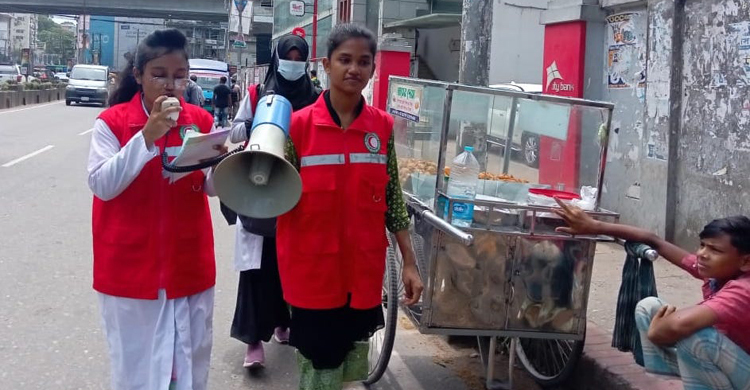Bangladesh Red Crescent Society takes urgent action to combat escalating dengue caseload

The Bangladesh Red Crescent Society (BDRCS) is actively responding to the alarming dengue caseload that has gripped the nation, affecting millions of people across the country. As the number of cases and fatalities continues to rise, the BDRCS, in collaboration with the International Federation of Red Cross and Red Crescent Societies (IFRC) and in-country partner national societies, is taking urgent measures to combat the spread of the mosquito-borne disease and providing much-needed support to affected communities.
According to the Directorate General of Health Service (DGHS), between 1 and 25 July, about 30 thousand people were affected, and 154 died. To address this crisis, more than 150 BDRCS volunteers trained in Epidemic Control for Volunteers (ECV) and Community-Based Health and First Aid (CBHFA), are mobilized to address this health emergency.
One of the major concerns is the shortage of concentrated platelet supplies, given the significant increase in dengue cases. The BDRCS, with its nationwide blood bank system, is ensuring continuous support to meet the rising demand. The Holy Family Red Crescent Medical College and Hospital (HFRCMCH) is well-equipped to treat dengue patients. The Hospital has admitted and treated 714 dengue patients as of July 25, with 220 patients still receiving medical care. In addition, BDRCS Chattogram Blood Bank distributed 462 concentrated platelets this year, while BDRCS Dhaka Blood Bank distributed 1,561 concentrated platelets.
Awareness and prevention are vital components of the BDRCS's response strategy. Working closely with Dhaka and Chattogram City Corporations, BDRCS volunteers are actively engaged in awareness campaigns and cleaning activities.
"In the face of this escalating dengue outbreak, the BDRCS remains committed to supporting affected communities and enhancing public health services," said Kazi Shofiqul Azam, Secretary General of the Bangladesh Red Crescent Society. "Our dedicated volunteers are tirelessly working to disseminate vital awareness messages and distribute necessary resources to support public health services."
“To further strengthen the dengue response operation of BDRCS in Bangladesh, IFRC has launched a Disaster Response Emergency Fund (DREF) to concentrate efforts on the most affected major cities, including Chattogram, Dhaka, and Barisal,” said Sanjeev Kafley, Head of IFRC Bangladesh Delegation. “The fund aims to enhance public health services, raise awareness, and support blood services to meet the increasing demand.”
Combating the current dengue situation needs collective actions engaging everyone. Collaborating with key stakeholders, the BDRCS is determined to curtail the spread of the disease and mitigate its impact on vulnerable communities.-Press Release.



